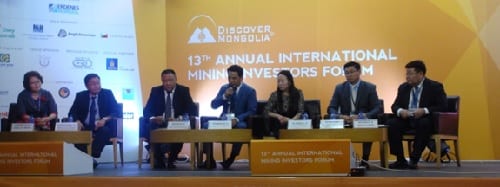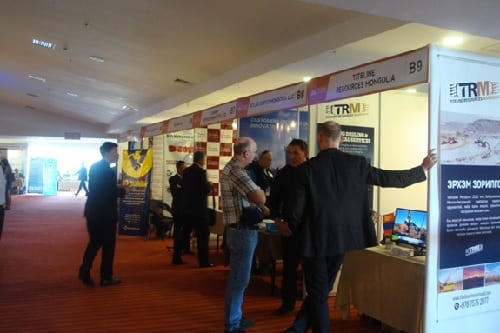Optimistic Miners and Pessimistic Officials: Observations about the ‘Discover Mongolia’ Conference, Ulaanbaatar, 2015
By uczipm0, on 20 October 2015
This post was written by Byambabaatar Ichinkhorloo, a member of the Emerging Subjects project and a doctoral candidate in anthropology at the National University of Mongolia.
This year, ‘Discover Mongolia’, the 13th Annual International Mining Investors Forum, was held on September 3-4, in Ulaanbaatar. The conference was organized under the sub-theme, ‘Mining Without Populism’. The keynote speakers of the conference claimed that the fundamental issues that have hindered the development of mining in Mongolia are populism, investment decline, and state intervention in business freedom. The conference is organized annually by ‘Prime Info’, a subsidiary company of Mongolian Investment Holding Group, and the Mongolian National Mining Association since 2002 and has become the platform for mining companies to attract investment and discuss urgent issues with the government of Mongolia.

Figure 1. The Opening Ceremony featuring: P. Ochirbat, former President of Mongolia, Du. Jargalsaikhan, Chairman of Mongolian Investment Holding Group, M. Enkhsaikhan, Minister of Mongolia, and R. Jijgid, Minister of Mining.
The conference, as highlighted by former president P. Ochirbat in his opening remarks, collected more participants than the previous year. Over 70 different organizations registered in the conference and the conference hall was full in the morning half, especially during the first three sessions, which included sessions entitled: ‘keynote speeches’, ‘government hour’, and ‘business freedom in the mining sector’. However, the number of participants decreased significantly in the following sessions and on the second day. Many of the participants, it seemed, expected the Prime Minister and other high officials to speak during the morning half, especially during the government hour. But two cabinet members Mr. Jigjid, Minister of Mining gave short opening remarks, and Mr. Enkhsaikhan, Minister in charge for mega projects, attended the first session, while during the government hour people from the department and division heads level presented.
Before discussing the conference and the investor and mining company’s perceptions about the current conditions of Mongolian mining, let me briefly discuss what has happened in Mongolia and the extractive sector in the past few years.
Mongolia suffered a sharp decline in foreign direct investment (FDI) in the extractive sector from MNT 5.2 trillion in 2011 to MNT 0.8 trillion in 2014 (due to Oyu Tolgoi mine start up in 2010 and suspension of OT underground mine in 2013), according to Mongolian Statistical Office. The World Bank estimates that foreign direct investment in Mongolia declined from US$ 4.7 billion in 2011 to US$ 2.1 billion in 2013.
So investment in-flow has declined, and its effects on the Mongolian economy and politics have fueled many economic and political debates in Mongolia, with some suggesting Mongolia should receive IMF Stand-By arrangements, while others, including Ts. Elbegdorj, President of Mongolia, have urged an increase in debt to GDP ratio up to 80% and to reach an agreement with Consortiums of Investors on Tavan Tolgoi coking coal mine and Rio Tinto on Oyu Tolgoi mine. Mongolian authorities have not been unanimous on raising necessary funds for development of mining infrastructure while arguing about railway track gauge and other mega projects through additional loan and bonds that might fill the investment shortages.
Even the government foreign debt issues have affected public opinion and created fear among the population, producing lively debates among social media based movements. So after months of debate, the parliament passed the government’s submitted laws related to debt management and fiscal stability and agreed to keep a debt to GDP ratio of up to 58.3% in 2015, 55% in 2016 and 50% in 2017 and 40% in 2018 and beyond.
As investment declines and the economy slows in Mongolia, there has been a rush to place blame on environmental movements that lobbied and supported the law with long name since 2009 (Law on Prohibiting Mineral Exploration and Extraction Near Water Sources, Protected Areas and Forests), which abandoned 488 mining licenses in water sources, protected area, and forests. Gold mining companies claimed compensation of MNT 202 billion from the government and later on moved against environmental movements especially targeting Ongi river movements through mass media while promising to increase foreign investments and Mongolia’s gold reserves.
After suspending the provision of new licenses for 5 years, the government began to issue exploration licenses through an online application system, based on priority rights in eastern and western Mongolia, from January 2015. This was one of the urgent issues that attracted the interest of many of the participants during the ‘government hour’ at the conference. According to the Ministry of Mining, the government is planning to provide 3000 exploration licenses in 30 million hectare lands and will keep all licensed area within 30% of Mongolian territory.

Figure 3. During “Government Hour” session, featuring representatives from Ministry of Mining, Ministry of Finance, head of Mongolian Mineral Resource Authority, Governor of Umnugovi aimag, and Tax Department.
At the end of the conference, it became increasingly clear to us that many foreign mining companies and service providers are still positive about the future of the Mongolian extractive sector. Chris MacDougall, from Mongolian Investment Banking Group, presented some of what he saw as the positive changes taking place in Mongolia, including the Foreign Investment Law, New Securities Law, Minerals law amendment, Tax Amnesty, OT Underground mining investment resolution and arrival of new Prime Minister Saikhanbileg in the past two years. “These changes made in the past two years are tremendous success of Mongolian government compared to previous ten years” stressed by Erdenes Mongol LLC.
Many participants also agreed that the failure to attract investors in mining projects has arisen due to the propagation of a bad image of Mongolia by outsiders that has scared new investors away from Mongolia. Panelists of the ‘business freedom’ session discussed how much Mongolia-related media is not transparent or clear or even true, and relevant institutions and agencies need to check for clarity. These insights were also reiterated in the presentations by Rio Tinto, Xanadu Mines, Aspire Mining, Erdenes Mongol companies. They asserted that Mongolia is open for business even though there are minor issues to be resolved, such as improving the business environment, transparency, and attracting Mongolia-specific investors.

Figure 4. Exhibition and poster by mining companies and mining service providers on the third floor, Corporate Convention Center, Ulaanbaatar.
Many participants expected more investment opportunity in the mining and mining subsidiary services, thanks to larger mining developments including OT underground agreement between Rio Tinto and Government of Mongolia and the soon-to-be expected Tavan Tolgoi agreement. As Minister Enkhsaikhan said at the conference, ‘the success of Tavan Tolgoi approval is around 10% even though it was 50% : 50% when it was submitted to the parliamentary approval’.
Enkhsaikhan and two other presenters highlighted the lost opportunities in relation to global commodity price cycles, and focused on how the Mongolian political cycles lost opportunities derived from global commodity cycles. It is true that many mining companies and development agencies are aware of the election-driven idle political period and try to reach agreements before election years. Many politicians and decision-makers became hesitant during election years and are slow to make any firm decisions that might affect his or her political reputations or election campaign. This in-activity reduces the number of new investments or or projects starting in election years.
In sum, there were two major tendencies among participants in the Discover Mongolia conference. One was to be cautious and pessimistic about the future of extractive industries in Mongolia and encourage laissez-faire or less government intervention in the mining sector, while securing more business freedom without any populism. Others, and often strongly expressed by private companies, saw the future of the Mongolian extractive sector in a more positive light, while seeking more secure investment and recommending the government of Mongolia to sell its bright news to the world, rather than focus on internal populist disputes.
4 Responses to “Optimistic Miners and Pessimistic Officials: Observations about the ‘Discover Mongolia’ Conference, Ulaanbaatar, 2015”
- 1
- 2
-
3
Hathelin wrote on 11 April 2023:
Hopefully, after this project, the parties will cooperate successfully and smoothly. At the same time, I also hope that the members will have the best projects or solutions. Whatever the problem, we should be positive and optimistic about it such as participating in donkey kong to boost your spirits.
-
4
Lila Kerr wrote on 25 April 2023:
Legit essay writing service is what I got when I used this company. I had a tight deadline and they were able to deliver on time with great quality. I highly recommend this company to anyone looking for a reliable and professional writing service.
 Close
Close





This is a very informative post. Thank you for writing it. The photos were very helpful in illustrating your points.